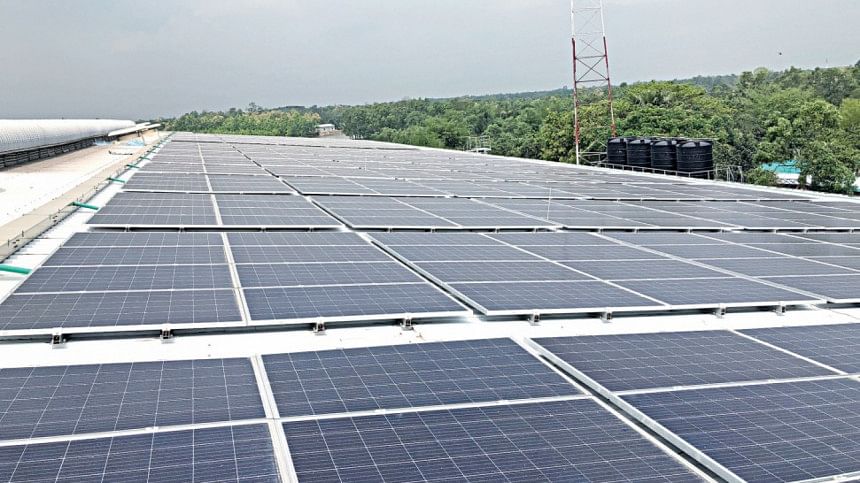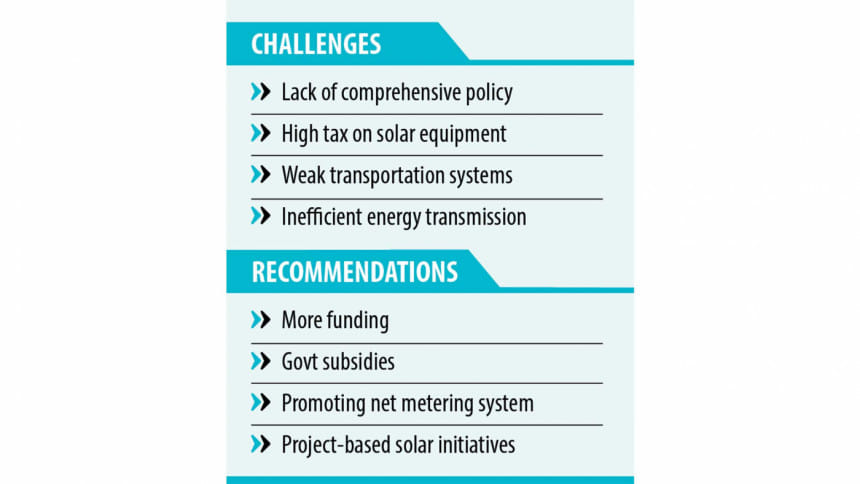Solar installation: ‘20pc EPZ spaces can add 222MW to nat’l grid’

An additional 222 megawatts could be added to the national grid if only 20 percent of open spaces within eight Export Processing Zones are utilised for solar installations, according to a study.
The study, conducted by Estiaque Bari, senior lecturer at the Department of Economics, East West University, also said over 333MW could be added to the national grid if 30 percent of open spaces can be utilised.
The findings were unveiled at a roundtable organised by Change Initiative at The Daily Star Centre in the capital.
Zakir Hossain Khan, chief executive at Change Initiative, said, "If 80 percent of spaces and household rooftops come under the net metering, the power generation will be massive and the country will be highly benefited."

Net metering is a billing tool that allows one to send the excess energy the panels generate to the local grid in exchange for credits on monthly electric bills.
The study outlined several challenges hindering the widespread adoption of rooftop solar systems in EPZs, including the lack of comprehensive policies, high taxes and duties on solar equipment, weak transportation systems, and inefficient energy transmission and distribution networks.
It also underscored the need for reforms in the EPZ Act to facilitate the adoption of net metering systems by industries.
To address these challenges and capitalise on the potential of solar energy, the study proposed a range of short-term and medium-term recommendations. Short-term recommendations include increasing the size of funds under Bangladesh Bank's refinancing scheme and introducing government subsidies for firms operating in industrial clusters. Medium-term recommendations focus on promoting net metering systems in industrial clusters, prioritising Economic Zones, and implementing project-based solar initiatives in existing EPZs.
Abul Khayer Md Aminur Rahman, member (power) at Bangladesh Energy Regulatory Commission , reiterated the government's commitment to generating 40 percent of electricity from clean energy sources by 2041.
However, Rahman acknowledged the challenges faced in implementing solar projects in EPZs, citing difficulties in overcoming bureaucratic hurdles.
He proposed allocating a portion of wheeling charges for net metering implementation in EPZ areas to benefit both sides.
Mohammad Hossain, director general of power cell at Power Division, advocated for increased solar power utilisation as an alternative to address the country's persistent gas crisis.
Nurul Akhter, president of the Solar and Renewable Energy Association, stressed the importance of raising awareness about solar net metering among industrial entrepreneurs. He underscored the potential of net metering to significantly meet electricity demand in factories.
Mohammad Nasiruddin Miah, executive engineer of Desco, Siddique Zobayer, a former member of Sustainable and Renewable Energy Development Authority, and representatives from both government and private sectors spoke at the event.

 For all latest news, follow The Daily Star's Google News channel.
For all latest news, follow The Daily Star's Google News channel. 


Comments